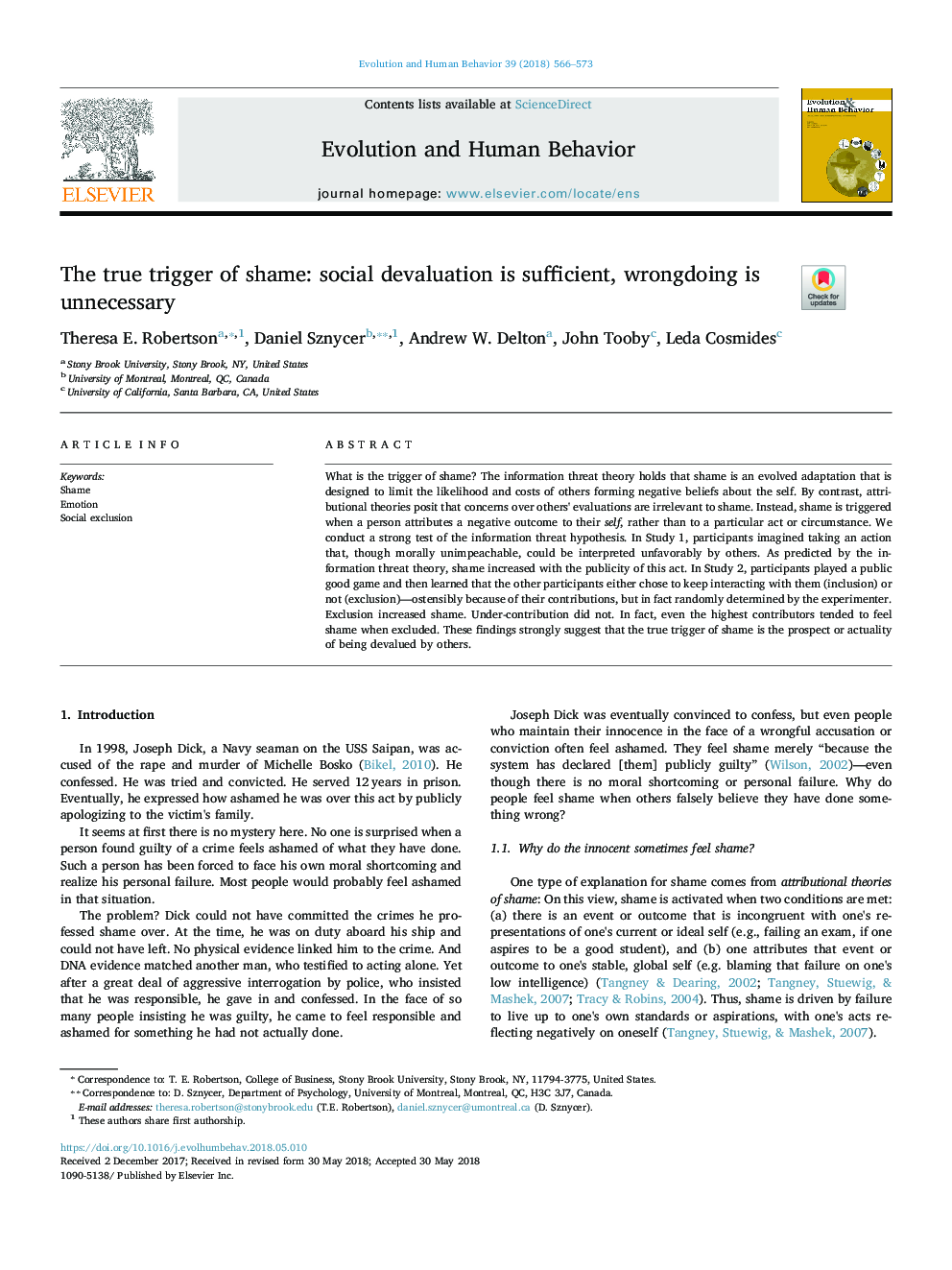| کد مقاله | کد نشریه | سال انتشار | مقاله انگلیسی | نسخه تمام متن |
|---|---|---|---|---|
| 7316159 | 1475505 | 2018 | 8 صفحه PDF | دانلود رایگان |
عنوان انگلیسی مقاله ISI
The true trigger of shame: social devaluation is sufficient, wrongdoing is unnecessary
ترجمه فارسی عنوان
حقیقت واقعی شرم آور: کاهش ارزش اجتماعی کافی است، اشتباه کردن غیر ضروری است
دانلود مقاله + سفارش ترجمه
دانلود مقاله ISI انگلیسی
رایگان برای ایرانیان
کلمات کلیدی
شرم هیجانی، محرومیت اجتماعی،
ترجمه چکیده
ماشه شرمساری چیست؟ نظریه تهدید اطلاعات حاکی از آن است که شرم سازگاری انحصاری است که برای محدود کردن احتمال و هزینه های دیگران، ایجاد اعتقادات منفی درباره خود طراحی شده است. در مقابل، تئوریهای وابستگی بر این باورند که نگرانی ها نسبت به ارزیابی های دیگر، به شرم نیربط است. در عوض، شرم برانگیختن زمانی رخ می دهد که فرد به نتایجی منفی نسبت به خود منجر شود، نه به یک عمل یا شرایط خاص. ما یک آزمون قوی از فرضیه تهدید اطلاعات انجام می دهیم. در مطالعه 1، شرکت کنندگان تصور کردند که اقداماتی را انجام دهند که اگر چه از لحاظ اخلاقی بی نظیر است، می تواند توسط دیگران تفسیر شود. همانطور که پیش بینی شده توسط نظریه تهدید اطلاعات، شرم آور با تبلیغ این عمل افزایش یافته است. در مطالعه 2، شرکت کنندگان یک بازی خوب عمومی را انجام دادند و سپس متوجه شدند که سایر شرکت کنندگان یا تصمیم گرفتند با آنها ارتباط برقرار کنند (شامل) یا نه (محرومیت) - بطور قابل ملاحظهای به دلیل مشارکتشان، اما در حقیقت به طور تصادفی توسط آزمایشگر تعیین شده است. انحصار شرم آور شد. زیرمجموعه انجام نشد در حقیقت، حتی بیشترین مشارکت کنندگان در هنگام حذف شدن تمایل به احساس شرم داشتند. این یافته ها به شدت نشان می دهد که حقیقت واقعی شرم آور، چشم انداز یا واقعیت است که دیگران آن را نادیده می گیرند.
موضوعات مرتبط
علوم زیستی و بیوفناوری
علوم کشاورزی و بیولوژیک
بوم شناسی، تکامل، رفتار و سامانه شناسی
چکیده انگلیسی
What is the trigger of shame? The information threat theory holds that shame is an evolved adaptation that is designed to limit the likelihood and costs of others forming negative beliefs about the self. By contrast, attributional theories posit that concerns over others' evaluations are irrelevant to shame. Instead, shame is triggered when a person attributes a negative outcome to their self, rather than to a particular act or circumstance. We conduct a strong test of the information threat hypothesis. In Study 1, participants imagined taking an action that, though morally unimpeachable, could be interpreted unfavorably by others. As predicted by the information threat theory, shame increased with the publicity of this act. In Study 2, participants played a public good game and then learned that the other participants either chose to keep interacting with them (inclusion) or not (exclusion)-ostensibly because of their contributions, but in fact randomly determined by the experimenter. Exclusion increased shame. Under-contribution did not. In fact, even the highest contributors tended to feel shame when excluded. These findings strongly suggest that the true trigger of shame is the prospect or actuality of being devalued by others.
ناشر
Database: Elsevier - ScienceDirect (ساینس دایرکت)
Journal: Evolution and Human Behavior - Volume 39, Issue 5, September 2018, Pages 566-573
Journal: Evolution and Human Behavior - Volume 39, Issue 5, September 2018, Pages 566-573
نویسندگان
Theresa E. Robertson, Daniel Sznycer, Andrew W. Delton, John Tooby, Leda Cosmides,
